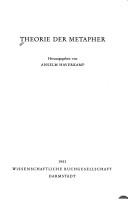| Listing 1 - 10 of 298 | << page >> |
Sort by
|
Book
Abstract | Keywords | Export | Availability | Bookmark
Book
ISBN: 9783770542147 3770542142 3846742147 9783846742143 Year: 2007 Publisher: Paderborn : Wilhelm Fink Verlag,
Abstract | Keywords | Export | Availability | Bookmark
 Loading...
Loading...Choose an application
- Reference Manager
- EndNote
- RefWorks (Direct export to RefWorks)
Zur Metapher versammelt Annäherungen an das Phänomen des Metaphorischen in und aus den Bereichen der Literatur, der Philosophie und der Wissenschaften. Relevante und bahnbrechende neue Aufsätze aus der analytischen Philosophie, der Wissenschaftstheorie (vor allem der Naturwissenschaften), der Linguistik und der Hermeneutik bieten eine Zusammenschau der Erklärungen dieses für die unterschiedlichen Disziplinen zentralen Konzepts "Metapher". Nach einleitenden Aufsätzen der Herausgeber, die sich kritisch mit der Behandlung der Metapher in den Kognitionswissenschaften (Eder) und der Davidsonschen Philosophie (Czernin) auseinandersetzen, bündelt der Abschnitt zur analytischen Philosophie die gegenwärtige Debatte in einander kommentierenden Aufsätzen von Severin Schroeder, Wolfgang Künne, Franz Josef Czernin und Samuel C. Wheeler. Die Abschnitte zu den Wissenschaften und zur Literatur beleuchten die Metapher als Analyseinstrument und als zu untersuchender Gegenstand, an Fallbeispielen und als allgemein wissenschaftstheoretische Überlegungen.
Metaphor --- Parabole --- Figures of speech --- Reification

ISBN: 353406948X 9783534069484 Year: 1977 Volume: 63 Publisher: Darmstadt: Wissenschaftliche Buchgesellschaft,
Abstract | Keywords | Export | Availability | Bookmark
 Loading...
Loading...Choose an application
- Reference Manager
- EndNote
- RefWorks (Direct export to RefWorks)
Literature --- Metaphor --- Parabole --- Figures of speech --- Reification --- Metaphor.
Book
ISBN: 9781845534462 9781845534479 1845534468 1845534476 9781845538385 1845538382 Year: 2010 Publisher: London : Equinox Publishing Ltd,
Abstract | Keywords | Export | Availability | Bookmark
 Loading...
Loading...Choose an application
- Reference Manager
- EndNote
- RefWorks (Direct export to RefWorks)
Using as a basis the discourse dynamics approach to metaphor developed by the editor, the book explores links between theory and empirical investigation, exemplifies data analysis and discusses issues in research design and practice. Particular attention is paid to the processes of metaphor identification, categorisation and labelling, and to the use of corpus linguistic and other computer-assisted methods.
Lexicology. Semantics --- Metaphor. --- Metaphor --- Parabole --- Figures of speech --- Reification

ISBN: 3534078322 9783534078325 Year: 1983 Volume: 389 Publisher: Darmstadt: Wissenschaftliche Buchgesellschaft,
Abstract | Keywords | Export | Availability | Bookmark
 Loading...
Loading...Choose an application
- Reference Manager
- EndNote
- RefWorks (Direct export to RefWorks)
Metaphor --- Parabole --- Figures of speech --- Reification --- Metaphor. --- Métaphore. --- Metafoor.
Book
ISBN: 2745304410 Year: 2002 Volume: 11 11 Publisher: Paris Champion
Abstract | Keywords | Export | Availability | Bookmark
 Loading...
Loading...Choose an application
- Reference Manager
- EndNote
- RefWorks (Direct export to RefWorks)
Book
ISBN: 9783937384580 Year: 2009 Publisher: Marbach am Neckar : Deutsche Schillergesellschaft,
Abstract | Keywords | Export | Availability | Bookmark
 Loading...
Loading...Choose an application
- Reference Manager
- EndNote
- RefWorks (Direct export to RefWorks)
Metaphor. --- Philosophy, Modern --- Metaphor --- Parabole --- Figures of speech --- Reification
Book
ISBN: 080147695X 0801460042 9780801460043 9780801449253 0801449251 1322522316 1501704354 9781501704352 9780801476952 Year: 2010 Publisher: Ithaca, N.Y. : Cornell University Press : Cornell University Library,
Abstract | Keywords | Export | Availability | Bookmark
 Loading...
Loading...Choose an application
- Reference Manager
- EndNote
- RefWorks (Direct export to RefWorks)
"Paradigms for a Metaphorology may be read as a kind of beginner's guide to Blumenberg, a programmatic introduction to his vast and multifaceted oeuvre. Its brevity makes it an ideal point of entry for readers daunted by the sheer bulk of Blumenberg's later writings, or distracted by their profusion of historical detail. Paradigms expresses many of Blumenberg's key ideas with a directness, concision, and clarity he would rarely match elsewhere. What is more, because it served as a beginner's guide for its author as well, allowing him to undertake an initial survey of problems that would preoccupy him for the remainder of his life, it has the additional advantage that it can offer us a glimpse into what might be called the 'genesis of the Blumenbergian world.'"-from the Afterword by Robert SavageWhat role do metaphors play in philosophical language? Are they impediments to clear thinking and clear expression, rhetorical flourishes that may well help to make philosophy more accessible to a lay audience, but that ought ideally to be eradicated in the interests of terminological exactness? Or can the images used by philosophers tell us more about the hopes and cares, attitudes and indifferences that regulate an epoch than their carefully elaborated systems of thought?In Paradigms for a Metaphorology, originally published in 1960 and here made available for the first time in English translation, Hans Blumenberg (1920-1996) approaches these questions by examining the relationship between metaphors and concepts. Blumenberg argues for the existence of "absolute metaphors" that cannot be translated back into conceptual language. These metaphors answer the supposedly naïve, theoretically unanswerable questions whose relevance lies quite simply in the fact that they cannot be brushed aside, since we do not pose them ourselves but find them already posed in the ground of our existence. They leap into a void that concepts are unable to fill.An afterword by the translator, Robert Savage, positions the book in the intellectual context of its time and explains its continuing importance for work in the history of ideas.
Metaphor. --- Parabole --- Figures of speech --- Reification --- Metaphor in literature.
Book
ISBN: 0674419472 0674419480 9780674419483 9780674430662 0674430662 9780674419476 Year: 2014 Publisher: Cambridge, MA : Harvard University Press,
Abstract | Keywords | Export | Availability | Bookmark
 Loading...
Loading...Choose an application
- Reference Manager
- EndNote
- RefWorks (Direct export to RefWorks)
Denis Donoghue turns his attention to the practice of metaphor and to its lesser cousins, simile, metonym, and synecdoche. Metaphor ("a carrying or bearing across") supposes that an ordinary word could have been used in a statement but hasn't been. Instead, something else, something unexpected, appears. The point of a metaphor is to enrich the reader's experience by bringing different associations to mind. The force of a good metaphor is to give something a different life, a new life. The essential character of metaphor, Donoghue says, is prophetic. Metaphors intend to change the world by changing our sense of it. At the center of Donoghue's study is the idea that metaphor permits the greatest freedom in the use of language because it exempts language from the local duties of reference and denotation. Metaphors conspire with the mind in its enjoyment of freedom. Metaphor celebrates imaginative life par excellence, from Donoghue's musings on Aquinas' Latin hymns, interspersed with autobiographical reflection, to his agile and perceptive readings of Wallace Stevens. When Donoghue surveys the history of metaphor and resistance to it, going back to Aristotle and forward to George Lakoff, he is a sly, cogent, and persuasive companion. He also addresses the question of whether or not metaphors can ever truly die. Reflected on every page of Metaphor are the accumulated wisdom of decades of reading and a sheer love of language and life.
Metaphor --- Metaphor in literature. --- Parabole --- Figures of speech --- Reification --- History.
Book
ISBN: 0884142191 9780884142195 9781628371758 1628371757 9780884142201 0884142205 Year: 2017 Publisher: Atlanta, Georgia : SBL Press,
Abstract | Keywords | Export | Availability | Bookmark
 Loading...
Loading...Choose an application
- Reference Manager
- EndNote
- RefWorks (Direct export to RefWorks)
Metaphor in the Bible. --- Metaphor. --- Parabole --- Figures of speech --- Reification
| Listing 1 - 10 of 298 | << page >> |
Sort by
|

 Search
Search Feedback
Feedback About UniCat
About UniCat  Help
Help News
News